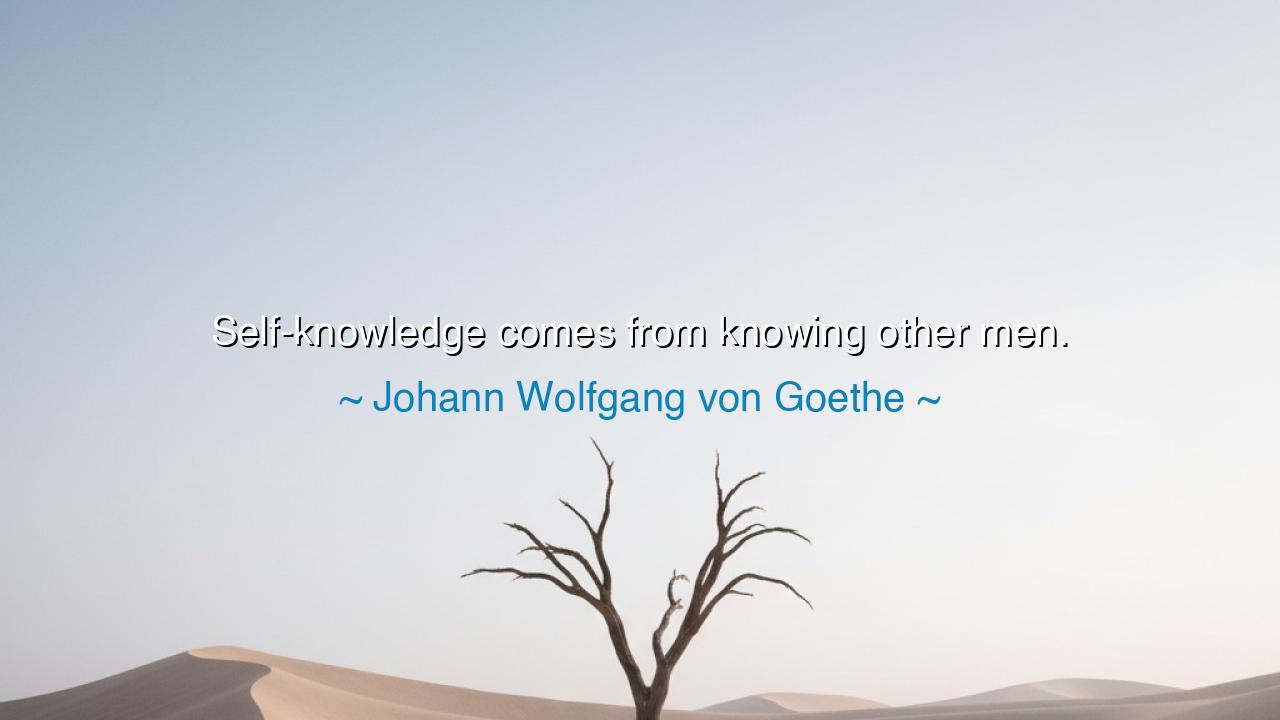
Self-knowledge comes from knowing other men.






"Self-knowledge comes from knowing other men." These words, spoken by the great Johann Wolfgang von Goethe, reveal a profound truth about the nature of human understanding. Goethe suggests that the journey to truly know oneself cannot be undertaken in isolation; it is in the relationship with others, in observing their behaviors, and in engaging with their stories that we begin to discover the deepest corners of our own souls. To understand our strengths, weaknesses, fears, and desires, we must first look outward, for it is through our connections with others that we can gain the most authentic insight into who we are.
In the ancient world, philosophers often spoke of the importance of self-awareness and self-examination. Socrates, the father of Western philosophy, famously said, "Know thyself." But Socrates, in his endless dialogues with others, knew that self-knowledge was not merely an intellectual pursuit, but a practical endeavor that required understanding the world around us. Plato, in his works, expounded on the idea that the philosopher must engage deeply with the world of ideas, but also with the people in the world. For Socrates and Plato, the act of self-reflection was inseparable from the interactions with others—human connection was the mirror in which we could see our true selves.
Goethe’s quote draws upon this same idea: the journey of self-discovery is intertwined with our understanding of others. Self-knowledge does not come from retreating into isolation or from searching for answers in abstract thoughts. Rather, it is through human interactions—in love, conflict, cooperation, and disagreement—that we come to know the fabric of our own character. For how can we understand our own capacity for compassion, if we do not witness and experience it with others? How can we know the depths of our courage, unless we stand by others in times of crisis? It is in the face of another’s struggles, joys, and imperfections that we often learn the most about our own.
Consider the life of Alexander the Great, a man whose conquests spanned vast lands and cultures. Though he is often remembered for his military genius, it was his encounters with different peoples—whether the Greeks, the Persians, or the Egyptians—that shaped his understanding of his own power and leadership. As he traveled the world, Alexander was not simply subjugating lands but engaging with them. It was in these interactions that he began to realize that true power lay not in domination but in understanding the complexity of others. It was through his knowledge of other cultures and peoples that he understood the depths of his own strength and limitations.
Similarly, Mahatma Gandhi, in his struggle for Indian independence, found his own moral compass sharpened not just through his reflections but through his encounters with the oppressed masses of India. Gandhi’s commitment to non-violence and self-rule grew from his intimate knowledge of the suffering and dignity of others. His empathy for the poor, the untouchables, and those oppressed by the British colonial regime helped him recognize his own purpose and the path he would follow. Gandhi’s engagement with the people was a constant source of self-discovery, teaching him the power of humility, compassion, and sacrifice.
Yet, Goethe’s wisdom extends beyond historical figures—it touches each of our lives. In our daily encounters with those around us, we too are offered the opportunity for self-exploration. Whether in the joys of family, the tensions of friendships, or the collaborations of work, each moment provides a chance to reflect on our reaction to others and, in turn, to see ourselves more clearly. We must ask: What do my actions toward others reveal about my own values? How do I respond when faced with conflict or pain? It is in these moments that we discover the truth of who we are.
The lesson Goethe imparts is clear and profound: we cannot understand ourselves fully without the context of others. The journey of self-knowledge requires connection—not just with our thoughts, but with the lives and experiences of those around us. Self-reflection is not an isolated process, but a dialogue with the world. Through compassion, empathy, and engagement, we unlock deeper layers of understanding within ourselves. Socrates sought wisdom from the streets of Athens, Alexander learned from the cultures he encountered, and Gandhi drew strength from the people he fought to free. All were shaped by their interactions with others.
In practical terms, to gain self-knowledge, we must engage deeply with the world. It is not enough to look inward; we must also be attentive to the needs, struggles, and perspectives of others. Seek to listen without judgment, to observe without assumption, and to connect without prejudice. In doing so, you will find that your own understanding deepens, that you come to recognize not only the world around you but also the depths of your own soul. The more you learn from others, the more you will learn from yourself. Through service, conversation, and reflection, we find the truth of who we are, and in this truth, we find the strength to grow.






AAdministratorAdministrator
Welcome, honored guests. Please leave a comment, we will respond soon